Comprehensive Analysis of the 2018 Travel & Tourism Sector
VerifiedAdded on 2020/10/04
|8
|2130
|103
Report
AI Summary
This report provides a comprehensive analysis of the travel and tourism sector in 2018, examining the various factors that influence the industry, such as transportation, government policies, the rise of millennials, terrorism, political unrest, and natural disasters. It further delves into the operations of the TUI group, analyzing its strategies to meet market demands, including expansion in hotels, resorts, airlines, and travel agencies, and partnerships with companies like Etihad Aviation and Air Berlin PLC. The report also assesses the economic, environmental, and societal impacts of TUI's activities, particularly in Greece and Turkey, highlighting the promotion of eco-tourism, employment generation, and infrastructural development. However, it also acknowledges the potential negative impacts, such as environmental concerns and the erosion of cultural uniqueness. The report concludes with strategies to mitigate these negative impacts, including clarifying regulations, educating tourists, and promoting corporate social responsibility to maximize the positive effects on tourist destinations.
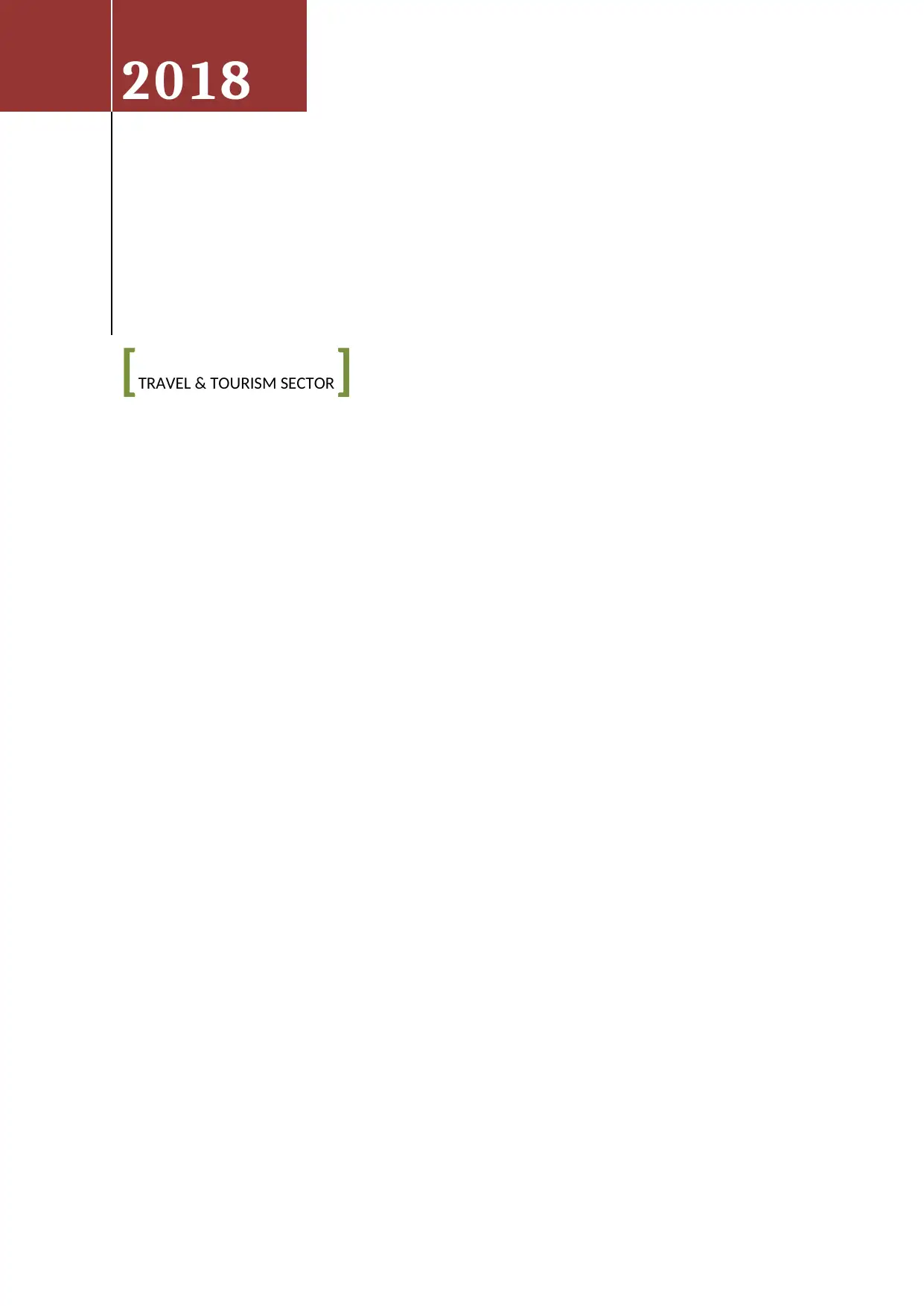
[TRAVEL & TOURISM SECTOR]
2018
2018
Paraphrase This Document
Need a fresh take? Get an instant paraphrase of this document with our AI Paraphraser
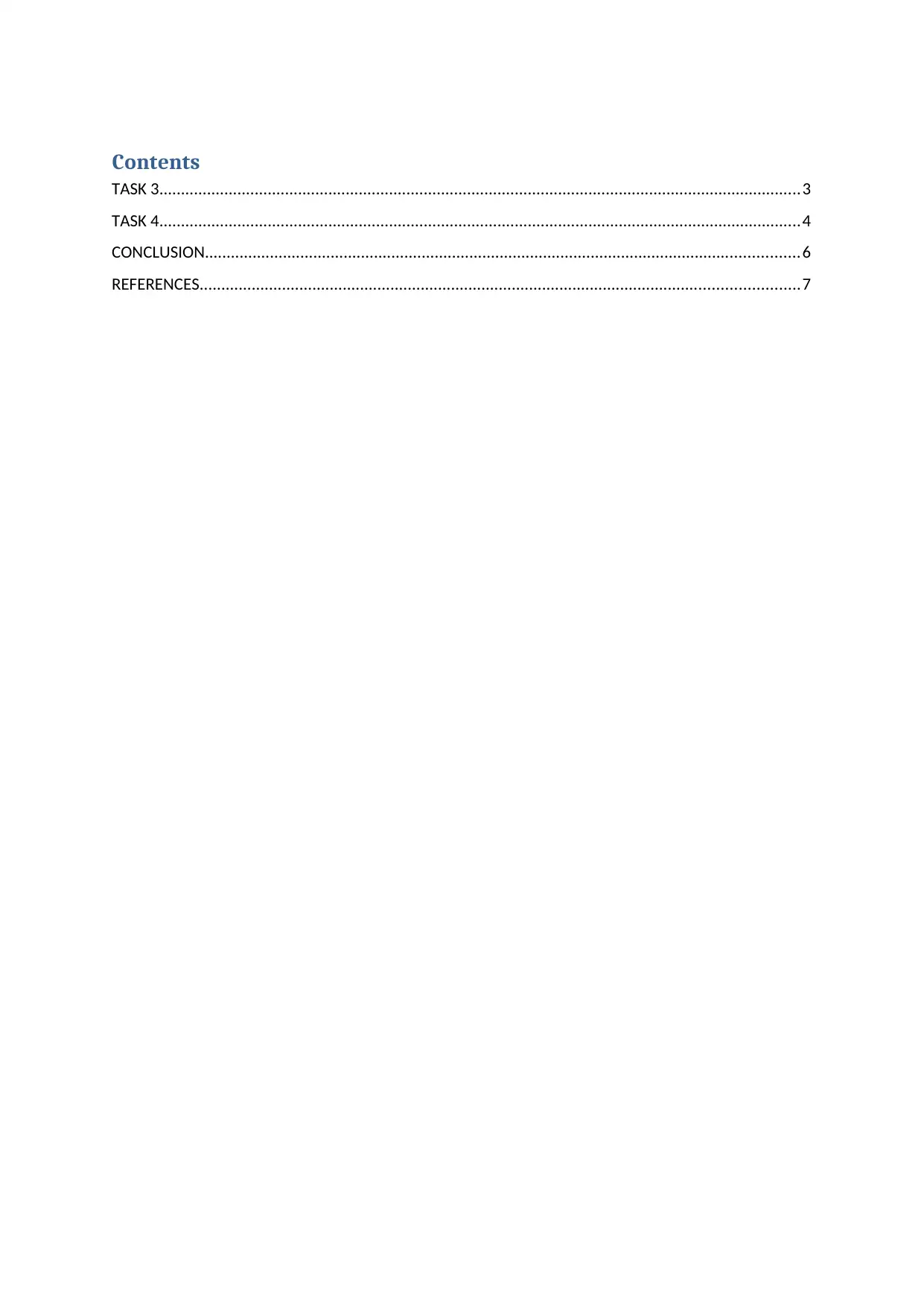
Contents
TASK 3....................................................................................................................................................3
TASK 4....................................................................................................................................................4
CONCLUSION.........................................................................................................................................6
REFERENCES..........................................................................................................................................7
TASK 3....................................................................................................................................................3
TASK 4....................................................................................................................................................4
CONCLUSION.........................................................................................................................................6
REFERENCES..........................................................................................................................................7
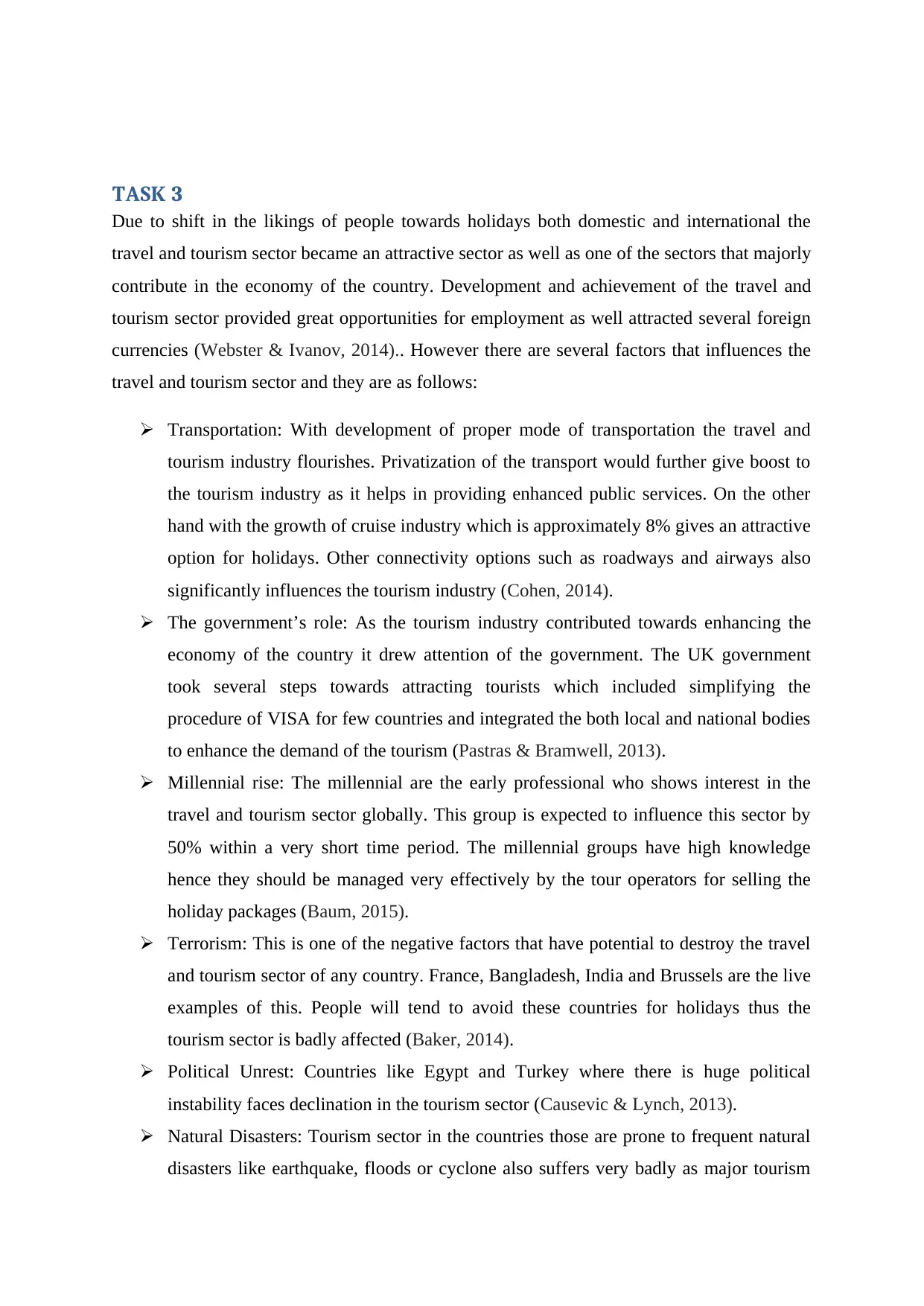
TASK 3
Due to shift in the likings of people towards holidays both domestic and international the
travel and tourism sector became an attractive sector as well as one of the sectors that majorly
contribute in the economy of the country. Development and achievement of the travel and
tourism sector provided great opportunities for employment as well attracted several foreign
currencies (Webster & Ivanov, 2014).. However there are several factors that influences the
travel and tourism sector and they are as follows:
Transportation: With development of proper mode of transportation the travel and
tourism industry flourishes. Privatization of the transport would further give boost to
the tourism industry as it helps in providing enhanced public services. On the other
hand with the growth of cruise industry which is approximately 8% gives an attractive
option for holidays. Other connectivity options such as roadways and airways also
significantly influences the tourism industry (Cohen, 2014).
The government’s role: As the tourism industry contributed towards enhancing the
economy of the country it drew attention of the government. The UK government
took several steps towards attracting tourists which included simplifying the
procedure of VISA for few countries and integrated the both local and national bodies
to enhance the demand of the tourism (Pastras & Bramwell, 2013).
Millennial rise: The millennial are the early professional who shows interest in the
travel and tourism sector globally. This group is expected to influence this sector by
50% within a very short time period. The millennial groups have high knowledge
hence they should be managed very effectively by the tour operators for selling the
holiday packages (Baum, 2015).
Terrorism: This is one of the negative factors that have potential to destroy the travel
and tourism sector of any country. France, Bangladesh, India and Brussels are the live
examples of this. People will tend to avoid these countries for holidays thus the
tourism sector is badly affected (Baker, 2014).
Political Unrest: Countries like Egypt and Turkey where there is huge political
instability faces declination in the tourism sector (Causevic & Lynch, 2013).
Natural Disasters: Tourism sector in the countries those are prone to frequent natural
disasters like earthquake, floods or cyclone also suffers very badly as major tourism
Due to shift in the likings of people towards holidays both domestic and international the
travel and tourism sector became an attractive sector as well as one of the sectors that majorly
contribute in the economy of the country. Development and achievement of the travel and
tourism sector provided great opportunities for employment as well attracted several foreign
currencies (Webster & Ivanov, 2014).. However there are several factors that influences the
travel and tourism sector and they are as follows:
Transportation: With development of proper mode of transportation the travel and
tourism industry flourishes. Privatization of the transport would further give boost to
the tourism industry as it helps in providing enhanced public services. On the other
hand with the growth of cruise industry which is approximately 8% gives an attractive
option for holidays. Other connectivity options such as roadways and airways also
significantly influences the tourism industry (Cohen, 2014).
The government’s role: As the tourism industry contributed towards enhancing the
economy of the country it drew attention of the government. The UK government
took several steps towards attracting tourists which included simplifying the
procedure of VISA for few countries and integrated the both local and national bodies
to enhance the demand of the tourism (Pastras & Bramwell, 2013).
Millennial rise: The millennial are the early professional who shows interest in the
travel and tourism sector globally. This group is expected to influence this sector by
50% within a very short time period. The millennial groups have high knowledge
hence they should be managed very effectively by the tour operators for selling the
holiday packages (Baum, 2015).
Terrorism: This is one of the negative factors that have potential to destroy the travel
and tourism sector of any country. France, Bangladesh, India and Brussels are the live
examples of this. People will tend to avoid these countries for holidays thus the
tourism sector is badly affected (Baker, 2014).
Political Unrest: Countries like Egypt and Turkey where there is huge political
instability faces declination in the tourism sector (Causevic & Lynch, 2013).
Natural Disasters: Tourism sector in the countries those are prone to frequent natural
disasters like earthquake, floods or cyclone also suffers very badly as major tourism
⊘ This is a preview!⊘
Do you want full access?
Subscribe today to unlock all pages.

Trusted by 1+ million students worldwide
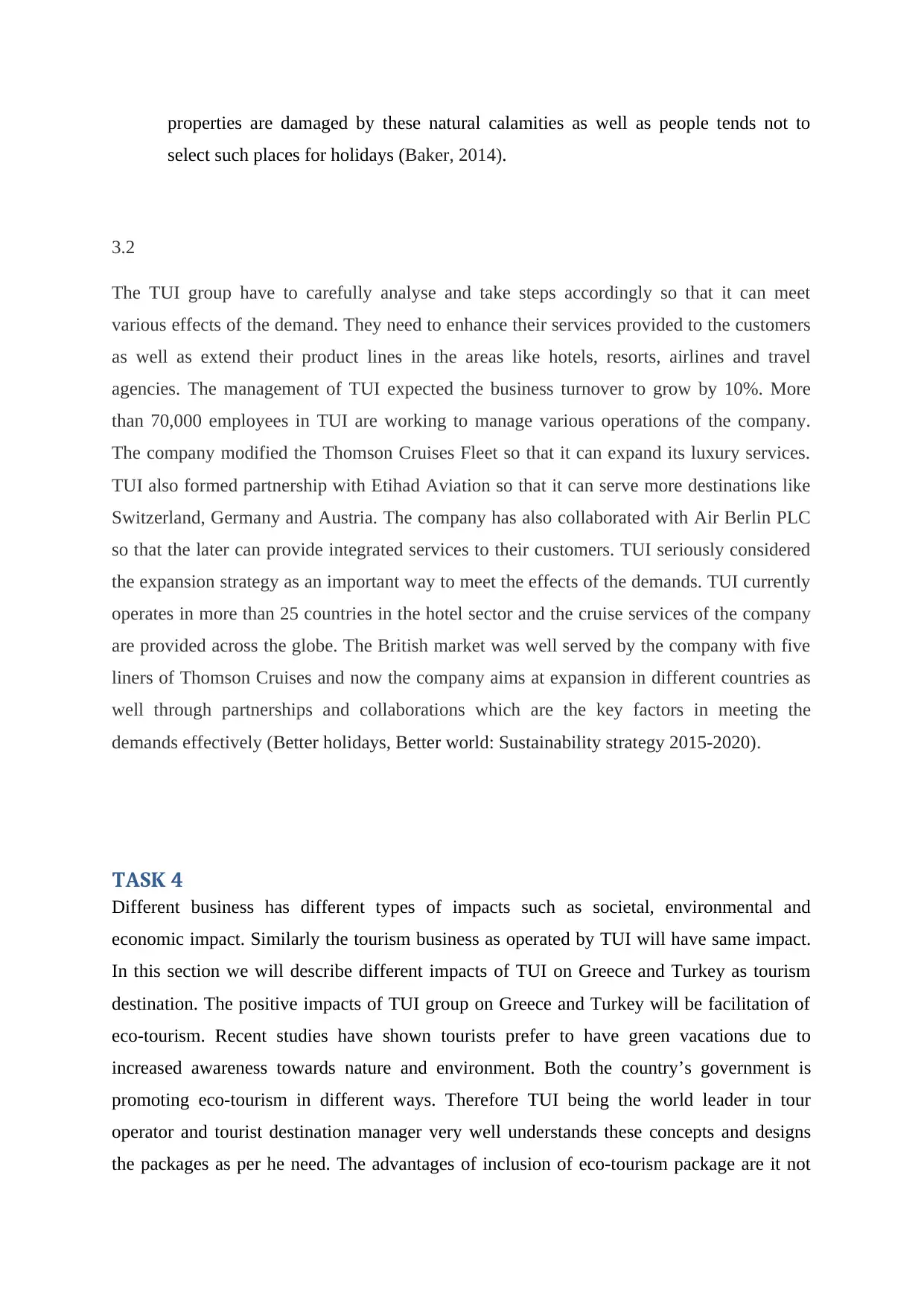
properties are damaged by these natural calamities as well as people tends not to
select such places for holidays (Baker, 2014).
3.2
The TUI group have to carefully analyse and take steps accordingly so that it can meet
various effects of the demand. They need to enhance their services provided to the customers
as well as extend their product lines in the areas like hotels, resorts, airlines and travel
agencies. The management of TUI expected the business turnover to grow by 10%. More
than 70,000 employees in TUI are working to manage various operations of the company.
The company modified the Thomson Cruises Fleet so that it can expand its luxury services.
TUI also formed partnership with Etihad Aviation so that it can serve more destinations like
Switzerland, Germany and Austria. The company has also collaborated with Air Berlin PLC
so that the later can provide integrated services to their customers. TUI seriously considered
the expansion strategy as an important way to meet the effects of the demands. TUI currently
operates in more than 25 countries in the hotel sector and the cruise services of the company
are provided across the globe. The British market was well served by the company with five
liners of Thomson Cruises and now the company aims at expansion in different countries as
well through partnerships and collaborations which are the key factors in meeting the
demands effectively (Better holidays, Better world: Sustainability strategy 2015-2020).
TASK 4
Different business has different types of impacts such as societal, environmental and
economic impact. Similarly the tourism business as operated by TUI will have same impact.
In this section we will describe different impacts of TUI on Greece and Turkey as tourism
destination. The positive impacts of TUI group on Greece and Turkey will be facilitation of
eco-tourism. Recent studies have shown tourists prefer to have green vacations due to
increased awareness towards nature and environment. Both the country’s government is
promoting eco-tourism in different ways. Therefore TUI being the world leader in tour
operator and tourist destination manager very well understands these concepts and designs
the packages as per he need. The advantages of inclusion of eco-tourism package are it not
select such places for holidays (Baker, 2014).
3.2
The TUI group have to carefully analyse and take steps accordingly so that it can meet
various effects of the demand. They need to enhance their services provided to the customers
as well as extend their product lines in the areas like hotels, resorts, airlines and travel
agencies. The management of TUI expected the business turnover to grow by 10%. More
than 70,000 employees in TUI are working to manage various operations of the company.
The company modified the Thomson Cruises Fleet so that it can expand its luxury services.
TUI also formed partnership with Etihad Aviation so that it can serve more destinations like
Switzerland, Germany and Austria. The company has also collaborated with Air Berlin PLC
so that the later can provide integrated services to their customers. TUI seriously considered
the expansion strategy as an important way to meet the effects of the demands. TUI currently
operates in more than 25 countries in the hotel sector and the cruise services of the company
are provided across the globe. The British market was well served by the company with five
liners of Thomson Cruises and now the company aims at expansion in different countries as
well through partnerships and collaborations which are the key factors in meeting the
demands effectively (Better holidays, Better world: Sustainability strategy 2015-2020).
TASK 4
Different business has different types of impacts such as societal, environmental and
economic impact. Similarly the tourism business as operated by TUI will have same impact.
In this section we will describe different impacts of TUI on Greece and Turkey as tourism
destination. The positive impacts of TUI group on Greece and Turkey will be facilitation of
eco-tourism. Recent studies have shown tourists prefer to have green vacations due to
increased awareness towards nature and environment. Both the country’s government is
promoting eco-tourism in different ways. Therefore TUI being the world leader in tour
operator and tourist destination manager very well understands these concepts and designs
the packages as per he need. The advantages of inclusion of eco-tourism package are it not
Paraphrase This Document
Need a fresh take? Get an instant paraphrase of this document with our AI Paraphraser
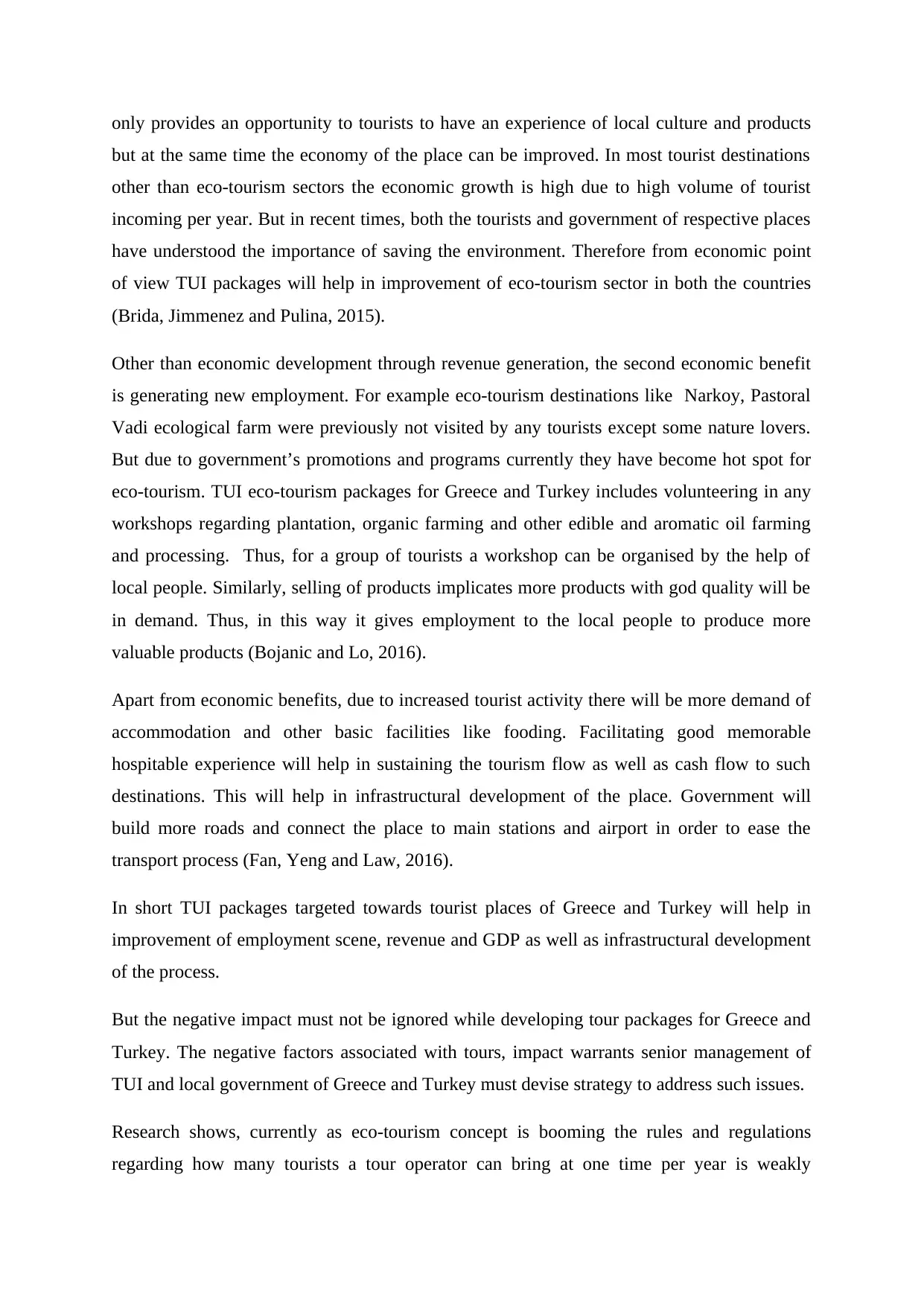
only provides an opportunity to tourists to have an experience of local culture and products
but at the same time the economy of the place can be improved. In most tourist destinations
other than eco-tourism sectors the economic growth is high due to high volume of tourist
incoming per year. But in recent times, both the tourists and government of respective places
have understood the importance of saving the environment. Therefore from economic point
of view TUI packages will help in improvement of eco-tourism sector in both the countries
(Brida, Jimmenez and Pulina, 2015).
Other than economic development through revenue generation, the second economic benefit
is generating new employment. For example eco-tourism destinations like Narkoy, Pastoral
Vadi ecological farm were previously not visited by any tourists except some nature lovers.
But due to government’s promotions and programs currently they have become hot spot for
eco-tourism. TUI eco-tourism packages for Greece and Turkey includes volunteering in any
workshops regarding plantation, organic farming and other edible and aromatic oil farming
and processing. Thus, for a group of tourists a workshop can be organised by the help of
local people. Similarly, selling of products implicates more products with god quality will be
in demand. Thus, in this way it gives employment to the local people to produce more
valuable products (Bojanic and Lo, 2016).
Apart from economic benefits, due to increased tourist activity there will be more demand of
accommodation and other basic facilities like fooding. Facilitating good memorable
hospitable experience will help in sustaining the tourism flow as well as cash flow to such
destinations. This will help in infrastructural development of the place. Government will
build more roads and connect the place to main stations and airport in order to ease the
transport process (Fan, Yeng and Law, 2016).
In short TUI packages targeted towards tourist places of Greece and Turkey will help in
improvement of employment scene, revenue and GDP as well as infrastructural development
of the process.
But the negative impact must not be ignored while developing tour packages for Greece and
Turkey. The negative factors associated with tours, impact warrants senior management of
TUI and local government of Greece and Turkey must devise strategy to address such issues.
Research shows, currently as eco-tourism concept is booming the rules and regulations
regarding how many tourists a tour operator can bring at one time per year is weakly
but at the same time the economy of the place can be improved. In most tourist destinations
other than eco-tourism sectors the economic growth is high due to high volume of tourist
incoming per year. But in recent times, both the tourists and government of respective places
have understood the importance of saving the environment. Therefore from economic point
of view TUI packages will help in improvement of eco-tourism sector in both the countries
(Brida, Jimmenez and Pulina, 2015).
Other than economic development through revenue generation, the second economic benefit
is generating new employment. For example eco-tourism destinations like Narkoy, Pastoral
Vadi ecological farm were previously not visited by any tourists except some nature lovers.
But due to government’s promotions and programs currently they have become hot spot for
eco-tourism. TUI eco-tourism packages for Greece and Turkey includes volunteering in any
workshops regarding plantation, organic farming and other edible and aromatic oil farming
and processing. Thus, for a group of tourists a workshop can be organised by the help of
local people. Similarly, selling of products implicates more products with god quality will be
in demand. Thus, in this way it gives employment to the local people to produce more
valuable products (Bojanic and Lo, 2016).
Apart from economic benefits, due to increased tourist activity there will be more demand of
accommodation and other basic facilities like fooding. Facilitating good memorable
hospitable experience will help in sustaining the tourism flow as well as cash flow to such
destinations. This will help in infrastructural development of the place. Government will
build more roads and connect the place to main stations and airport in order to ease the
transport process (Fan, Yeng and Law, 2016).
In short TUI packages targeted towards tourist places of Greece and Turkey will help in
improvement of employment scene, revenue and GDP as well as infrastructural development
of the process.
But the negative impact must not be ignored while developing tour packages for Greece and
Turkey. The negative factors associated with tours, impact warrants senior management of
TUI and local government of Greece and Turkey must devise strategy to address such issues.
Research shows, currently as eco-tourism concept is booming the rules and regulations
regarding how many tourists a tour operator can bring at one time per year is weakly
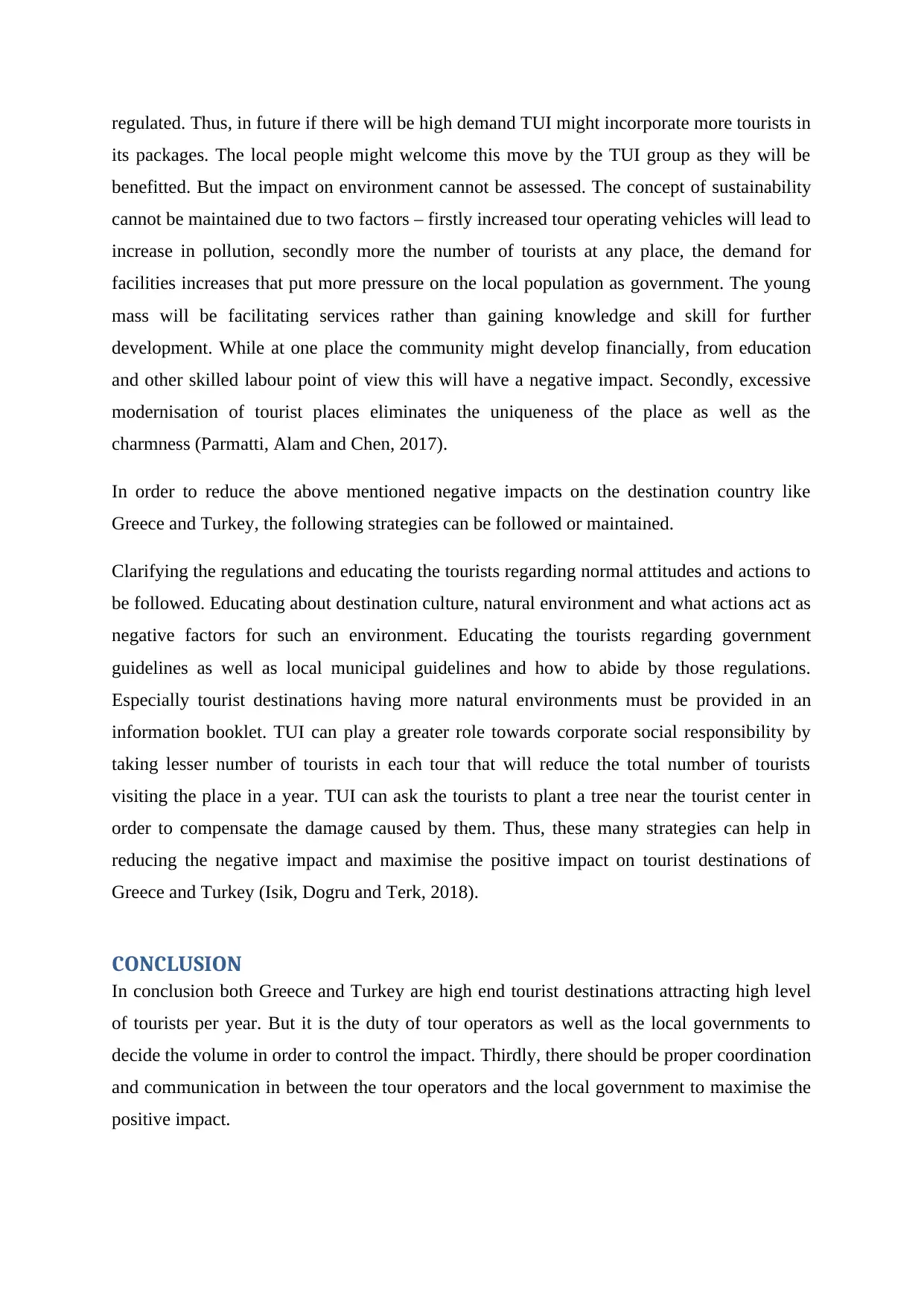
regulated. Thus, in future if there will be high demand TUI might incorporate more tourists in
its packages. The local people might welcome this move by the TUI group as they will be
benefitted. But the impact on environment cannot be assessed. The concept of sustainability
cannot be maintained due to two factors – firstly increased tour operating vehicles will lead to
increase in pollution, secondly more the number of tourists at any place, the demand for
facilities increases that put more pressure on the local population as government. The young
mass will be facilitating services rather than gaining knowledge and skill for further
development. While at one place the community might develop financially, from education
and other skilled labour point of view this will have a negative impact. Secondly, excessive
modernisation of tourist places eliminates the uniqueness of the place as well as the
charmness (Parmatti, Alam and Chen, 2017).
In order to reduce the above mentioned negative impacts on the destination country like
Greece and Turkey, the following strategies can be followed or maintained.
Clarifying the regulations and educating the tourists regarding normal attitudes and actions to
be followed. Educating about destination culture, natural environment and what actions act as
negative factors for such an environment. Educating the tourists regarding government
guidelines as well as local municipal guidelines and how to abide by those regulations.
Especially tourist destinations having more natural environments must be provided in an
information booklet. TUI can play a greater role towards corporate social responsibility by
taking lesser number of tourists in each tour that will reduce the total number of tourists
visiting the place in a year. TUI can ask the tourists to plant a tree near the tourist center in
order to compensate the damage caused by them. Thus, these many strategies can help in
reducing the negative impact and maximise the positive impact on tourist destinations of
Greece and Turkey (Isik, Dogru and Terk, 2018).
CONCLUSION
In conclusion both Greece and Turkey are high end tourist destinations attracting high level
of tourists per year. But it is the duty of tour operators as well as the local governments to
decide the volume in order to control the impact. Thirdly, there should be proper coordination
and communication in between the tour operators and the local government to maximise the
positive impact.
its packages. The local people might welcome this move by the TUI group as they will be
benefitted. But the impact on environment cannot be assessed. The concept of sustainability
cannot be maintained due to two factors – firstly increased tour operating vehicles will lead to
increase in pollution, secondly more the number of tourists at any place, the demand for
facilities increases that put more pressure on the local population as government. The young
mass will be facilitating services rather than gaining knowledge and skill for further
development. While at one place the community might develop financially, from education
and other skilled labour point of view this will have a negative impact. Secondly, excessive
modernisation of tourist places eliminates the uniqueness of the place as well as the
charmness (Parmatti, Alam and Chen, 2017).
In order to reduce the above mentioned negative impacts on the destination country like
Greece and Turkey, the following strategies can be followed or maintained.
Clarifying the regulations and educating the tourists regarding normal attitudes and actions to
be followed. Educating about destination culture, natural environment and what actions act as
negative factors for such an environment. Educating the tourists regarding government
guidelines as well as local municipal guidelines and how to abide by those regulations.
Especially tourist destinations having more natural environments must be provided in an
information booklet. TUI can play a greater role towards corporate social responsibility by
taking lesser number of tourists in each tour that will reduce the total number of tourists
visiting the place in a year. TUI can ask the tourists to plant a tree near the tourist center in
order to compensate the damage caused by them. Thus, these many strategies can help in
reducing the negative impact and maximise the positive impact on tourist destinations of
Greece and Turkey (Isik, Dogru and Terk, 2018).
CONCLUSION
In conclusion both Greece and Turkey are high end tourist destinations attracting high level
of tourists per year. But it is the duty of tour operators as well as the local governments to
decide the volume in order to control the impact. Thirdly, there should be proper coordination
and communication in between the tour operators and the local government to maximise the
positive impact.
⊘ This is a preview!⊘
Do you want full access?
Subscribe today to unlock all pages.

Trusted by 1+ million students worldwide
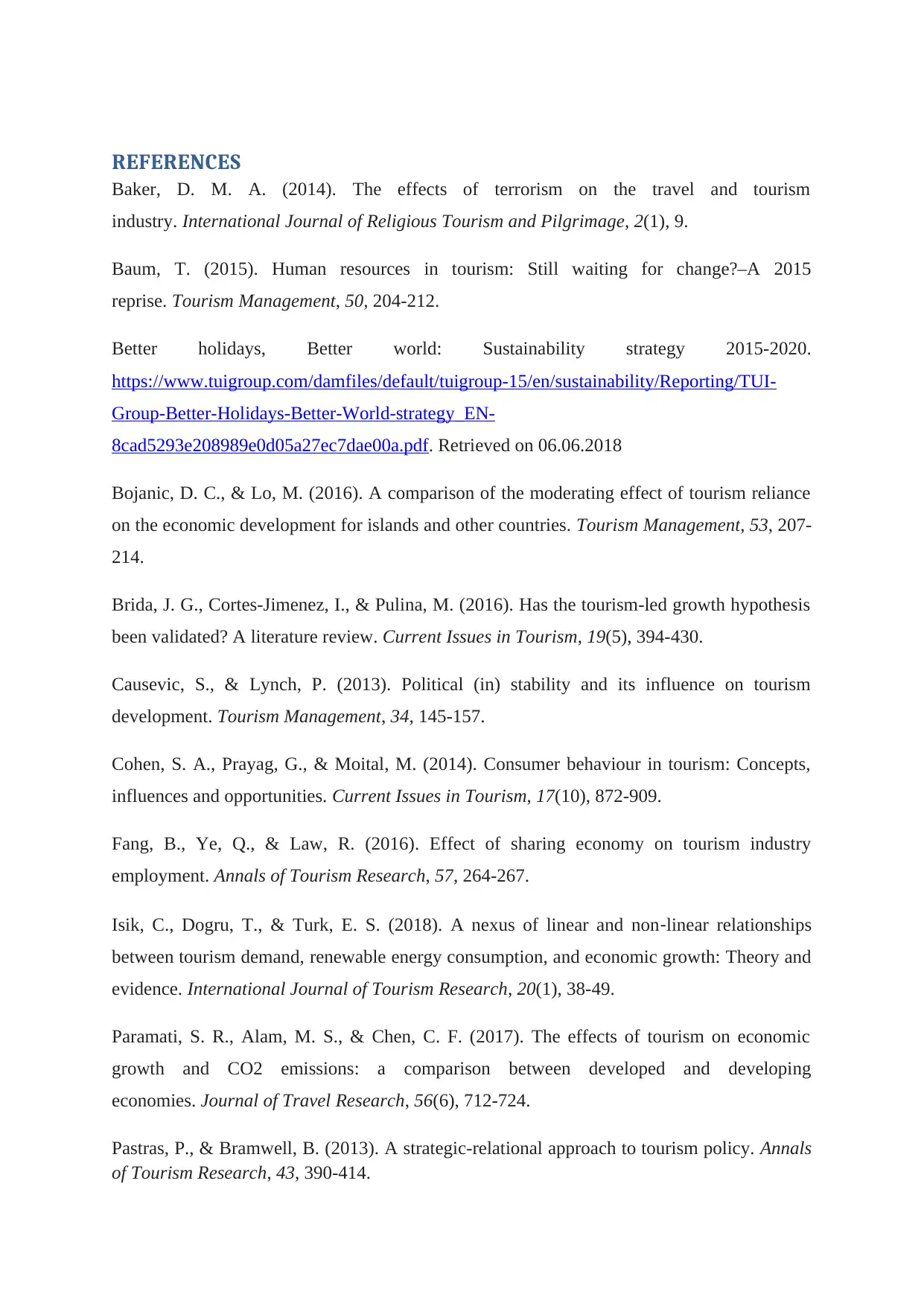
REFERENCES
Baker, D. M. A. (2014). The effects of terrorism on the travel and tourism
industry. International Journal of Religious Tourism and Pilgrimage, 2(1), 9.
Baum, T. (2015). Human resources in tourism: Still waiting for change?–A 2015
reprise. Tourism Management, 50, 204-212.
Better holidays, Better world: Sustainability strategy 2015-2020.
https://www.tuigroup.com/damfiles/default/tuigroup-15/en/sustainability/Reporting/TUI-
Group-Better-Holidays-Better-World-strategy_EN-
8cad5293e208989e0d05a27ec7dae00a.pdf. Retrieved on 06.06.2018
Bojanic, D. C., & Lo, M. (2016). A comparison of the moderating effect of tourism reliance
on the economic development for islands and other countries. Tourism Management, 53, 207-
214.
Brida, J. G., Cortes-Jimenez, I., & Pulina, M. (2016). Has the tourism-led growth hypothesis
been validated? A literature review. Current Issues in Tourism, 19(5), 394-430.
Causevic, S., & Lynch, P. (2013). Political (in) stability and its influence on tourism
development. Tourism Management, 34, 145-157.
Cohen, S. A., Prayag, G., & Moital, M. (2014). Consumer behaviour in tourism: Concepts,
influences and opportunities. Current Issues in Tourism, 17(10), 872-909.
Fang, B., Ye, Q., & Law, R. (2016). Effect of sharing economy on tourism industry
employment. Annals of Tourism Research, 57, 264-267.
Isik, C., Dogru, T., & Turk, E. S. (2018). A nexus of linear and non‐linear relationships
between tourism demand, renewable energy consumption, and economic growth: Theory and
evidence. International Journal of Tourism Research, 20(1), 38-49.
Paramati, S. R., Alam, M. S., & Chen, C. F. (2017). The effects of tourism on economic
growth and CO2 emissions: a comparison between developed and developing
economies. Journal of Travel Research, 56(6), 712-724.
Pastras, P., & Bramwell, B. (2013). A strategic-relational approach to tourism policy. Annals
of Tourism Research, 43, 390-414.
Baker, D. M. A. (2014). The effects of terrorism on the travel and tourism
industry. International Journal of Religious Tourism and Pilgrimage, 2(1), 9.
Baum, T. (2015). Human resources in tourism: Still waiting for change?–A 2015
reprise. Tourism Management, 50, 204-212.
Better holidays, Better world: Sustainability strategy 2015-2020.
https://www.tuigroup.com/damfiles/default/tuigroup-15/en/sustainability/Reporting/TUI-
Group-Better-Holidays-Better-World-strategy_EN-
8cad5293e208989e0d05a27ec7dae00a.pdf. Retrieved on 06.06.2018
Bojanic, D. C., & Lo, M. (2016). A comparison of the moderating effect of tourism reliance
on the economic development for islands and other countries. Tourism Management, 53, 207-
214.
Brida, J. G., Cortes-Jimenez, I., & Pulina, M. (2016). Has the tourism-led growth hypothesis
been validated? A literature review. Current Issues in Tourism, 19(5), 394-430.
Causevic, S., & Lynch, P. (2013). Political (in) stability and its influence on tourism
development. Tourism Management, 34, 145-157.
Cohen, S. A., Prayag, G., & Moital, M. (2014). Consumer behaviour in tourism: Concepts,
influences and opportunities. Current Issues in Tourism, 17(10), 872-909.
Fang, B., Ye, Q., & Law, R. (2016). Effect of sharing economy on tourism industry
employment. Annals of Tourism Research, 57, 264-267.
Isik, C., Dogru, T., & Turk, E. S. (2018). A nexus of linear and non‐linear relationships
between tourism demand, renewable energy consumption, and economic growth: Theory and
evidence. International Journal of Tourism Research, 20(1), 38-49.
Paramati, S. R., Alam, M. S., & Chen, C. F. (2017). The effects of tourism on economic
growth and CO2 emissions: a comparison between developed and developing
economies. Journal of Travel Research, 56(6), 712-724.
Pastras, P., & Bramwell, B. (2013). A strategic-relational approach to tourism policy. Annals
of Tourism Research, 43, 390-414.
Paraphrase This Document
Need a fresh take? Get an instant paraphrase of this document with our AI Paraphraser

Webster, C., & Ivanov, S. (2014). Transforming competitiveness into economic benefits:
Does tourism stimulate economic growth in more competitive destinations?. Tourism
Management, 40, 137-140.
Does tourism stimulate economic growth in more competitive destinations?. Tourism
Management, 40, 137-140.
1 out of 8
Related Documents
Your All-in-One AI-Powered Toolkit for Academic Success.
+13062052269
info@desklib.com
Available 24*7 on WhatsApp / Email
![[object Object]](/_next/static/media/star-bottom.7253800d.svg)
Unlock your academic potential
Copyright © 2020–2026 A2Z Services. All Rights Reserved. Developed and managed by ZUCOL.





